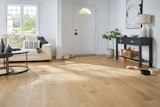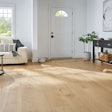
Florida Sen. Bill Nelson, in wake of Sunday night’s “60 Minutes” investigation that claimed the formaldehyde emissions of Lumber Liquidators Chinese-made laminate products were above CARB standards, has requested a federal investigation.
He sent a letter, reprinted in full below, on Wednesday to the heads of the Consumer Product Safety Commission, Centers for Disease Control and Prevention and the Federal Trade Commission calling for independent testing of Lumber Liquidators laminate flooring products.
“Because this could affect millions of homeowners, it’s imperative we get some answers quickly,” Nelson, the ranking Democrat on the Senate Committee on Commerce, Science and Transportation, said in a statement.
Lumber Liquidators stock started at $41.65 on Wednesday. It began to drop after the letter became public, and finished the day down 14 percent at $35.70.
 Lumber Liquidators stock price rom March 2 to March 5.
Lumber Liquidators stock price rom March 2 to March 5.
Lumber Liquidators stock was at $68.78 the morning of Feb. 25, the day of its annual earnings conference call during which the company announced both that it believed it would have negative coverage on the upcoming “60 Minutes” episode and that it expected federal charges related to potential Lacey Act violations. The company’s stock was, at time of this posting, trading at $34.38—a 50 percent loss since Feb. 25 and the lowest the stock has been since July 2012. The stock was at an all-time high of $119.44 on Nov. 15, 2013.
 Lumber Liquidators stock price over the past five years.
Lumber Liquidators stock price over the past five years.
In his letter, Nelson asked that the CPSC and CDC investigate and test Lumber Liquidators laminate floor products to determine if they pose a public health risk. He called for the CPSC and CDC tests to replicate the inter-agency initiative that tested defective Chinese drywall.
He also asked that the FTC assess whether the company engaged in an “unfair or deceptive trade practice,” referring to the part of the “60 Minutes” report that appeared to show Chinese manufacturers admitting to mislabeling the Lumber Liquidators laminate product as CARB Phase 2 compliant.
Nelson’s letter specifically references the National Wood Flooring Association as an industry stakeholder that may have played a part in delaying the nationwide implementation of the Formaldehyde Standards Act, but NWFA CEO Michael Martin clarified that the NWFA does not oppose the Act. “What the wood flooring industry continues to request is for federal regulations to mirror California’s existing CARB regulations so there aren’t conflicting or confusing rules to follow in the manufacturing, sales, or installation of products. Unless the federal requirements are parallel to CARB, confusion over which regulations to follow and unnecessary cost in doing so is added. Our association absolutely advocates for safe and controlled levels of any additive chemicals that may affect the health of installers or consumers,” Martin explained.






















